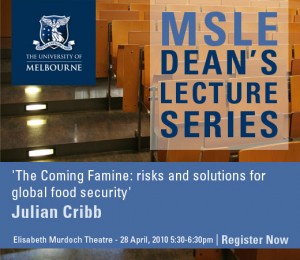We write for the general public, we talk to the general public. But who exactly are the general public? Join us for a discussion on public surveys, polls and focus groups at 7pm on Tuesday 20 April at the Clare Café in Carlton. This ASC session will be preceded by the AGM for the Victorian Branch of the Australian Science Communicators. If you’re interested in being involved, here’s your chance.
In this bulletin:
Polls and surveys: what works? Finding out what the public really think: Tuesday 20 April
ASC Victorian Branch AGM: Tuesday 20 April
Reporting back on the ASC National Conference 2010
Kind regards, Niall
ASC Victoria President
And Creative Director, Science in Public
Polls and surveys: what works? Finding out what the public really think: Tuesday 20 April
6.45pm for 7pm
· We write for the general public, we talk to the general public. But who exactly are the general public? And how do we know what they think? Or even whether they are interested in science in the first place?
· Join us for a discussion on public surveys, polls and focus groups.
· How easy is it to conduct a survey? What can surveys reveal? And how can we use them to better direct our communication efforts?
· Our panel includes a representative of polling company Roy Morgan, who will explain what’s involved in creating and running a poll; and two users – one from state government, one from federal government – who will talk about their experiences in conducting large public surveys, what worked, what didn’t and what people really think about science.
· The speakers are:
* Craig Cormick, Manager of Public Awareness for the federal government’s National Enabling Technologies Strategy
* Wendy Williams, Manager of Science and Community for the Victorian Department of Innovation, Industry and Regional Development
* Bruce Packard, National Customised Research Director for Roy Morgan Research
·
· Where: The Clare, 421 Rathdowne Street, Carlton
· When: Tuesday 20 April
· Time: 7pm to 8pm, followed by dinner. Please note the AGM for the Victorian branch will be held before the session from 6.15pm. Free drink on arrival for all attending the AGM.
· RSVP: Sarah Brooker sarah@scienceinpublic.com.au, 0413 332 489
· Cost: Free for members, $10 for non-members $5 for students. Meals and drinks at bar prices.
· Download a poster of this session here for your workplace lunchroom or office noticeboard.
ASC Victorian Branch AGM: Tuesday 20 April
6pm for 6.15pm Free drink for all members attending
It’s time for a bit of democracy – it’s time for AGM of the Victorian branch of the Australian Science Communicators.
Please come along and help to shape the ASC. We welcome your ideas, your nominations and your votes for the new committee. If you’re passionate about science communication please consider nominating for one of the following positions.
· President
· Secretary
· Treasurer
· Committee members – we currently have five.
The committee’s main function is organising networking, professional development and public events.
Often we invite speakers on current issues relating to science communication and it is an opportunity to share our thoughts and experiences in an informal atmosphere.
Previous speakers and sessions have included:
· Apollo astronaut Harrison Schmidt
· Fred Mendelsohn, Director of the Howard Florey Institute talking about the biochemistry of depression
· Peter McGauran, the Federal Science Minister at the time
· Lawrence Krauss on The Physics of Star Trek
· Scott Sampson on The Dinosaurs of West America
· A designer, a publisher and a typographer discussing Brochures, banners and budgets. Oh my!
· Our networking evening Science Centric at the three degrees bar and brewery
· science comedians, science artists, museum exhibitors and more.
More information on the ASC on the ASC website: www.asc.asn.au
Current committee positions and office bearers are: – President: Niall Byrne – Secretary & Treasurer: Jason Major – ASC national committee representative: Meg Rive (not seeking re-election) – General committee members: L.E. Ohman, Ian Muchamore, James Hutson, Maia Sauren, and Laura Miles
Reporting back on the ASC National Conference 2010
· Over 230 delegates attended the ASC National Conference in Canberra from 7 to 10 February.
· Senator the Hon Kim Carr, Minister for Innovation, Industry, Science and Research opened the conference and launched ‘Inspiring Australia’, a report which calls for all scientific organisations to promote the ideals of “clear vision, strong leadership and coherent action”.
· Current ASC’s President Congratulations http://www.asc.asn.au/2010/02/from-the-president2/
· The Conference Ning (with a still growing list of conference resources: bios, session summaries, powerpoint slides etc): http://ascconference2010.ning.com/ (currently invite only: please email Kali Madden, office@asc.asn.au if you require access)
· Inspiring Australia Report: http://www.innovation.gov.au/General/Corp-MC/Pages/InspiringAustralia.aspx
Kind regards,
Niall
__________
Niall Byrne
ASC Victorian Branch President and
Creative Director Science in Public
ph +61 3 9398 1416 mobile +61 417 131 977 skype niall_byrne
niall@scienceinpublic.com.au www.scienceinpublic.com
_______________________________________________ ASC-list mailing list list@asc.asn.au http://www.asc.asn.au/index.php?option=com_content&task=view&id=97&Itemid=115



